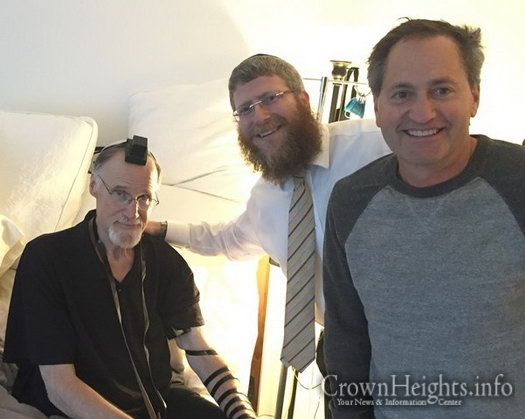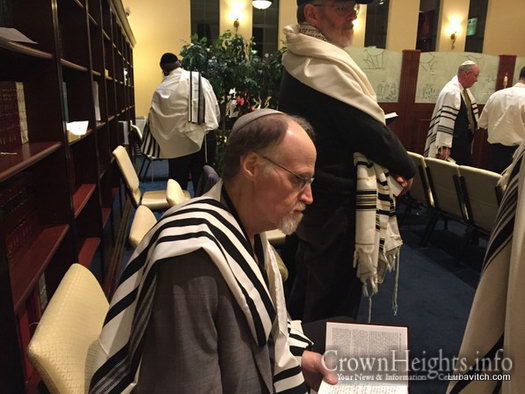
Story: ‘Tell Them It’s Never Too Late’
by Baila Olidort – Lubavitch.com
The rabbinical students hesitated before knocking. The name on the doorbell read David O’Malley-Keyes. Not a very Jewish sounding name. But you never know.
Levi Levertov and Yisrael Treitel had come from New York looking for Jews in Alaska’s vast hinterlands. They followed a few leads from Wasilla’s local Chabad representative, Rabbi Mendel Greenberg.
From inside the house they overheard a man’s voice call out, “Look, we’ve got guys in yarmulkas here!”
A woman came to the door. After a few minutes, Julia O’Malley told them that her mother was Jewish. Her brother David, the tall fellow resting in the living room, was terminally ill. Perhaps this wasn’t a good time. They exchanged contact information. The rabbis were about to leave when the ailing man struck up a conversation with them. One of the rabbis asked him if he knows what tefillin are.
He didn’t.
Did he have a bar-mitzvah?
He hadn’t.
Would he like a two-minute bar-mitzvah now, the rabbis offered.
David Austin O’Malley-Keyes asked them to please come in.
As they began to bind the tefillin with David, his complexion changed. He’d only recently learned that his maternal grandmother was Jewish, a fact that helped explain why he never felt quite right thinking he was Christian. He read the Shema for the first time, now emotionally overwhelmed. The rabbinical students wished him “Mazel Tov!” David’s sister snapped a few photos.
“Do you remember, David,” his sister asked him, “that you said you wished you had something that you could take with you to the ‘other side’?”
David took some time to regain his composure.
“I did,” he said. Tears spilled from his eyes. “Please believe me,” he told the young men, “that for this alone it was worth it for you to come from New York.”
Before the rabbinical students were due to return to New York, Wasilla’s Chabad representative invited the community to join the the young rabbis at Chabad’s Shabbat dinner. A very weakened David made the effort to come with his sister Julia.
David spoke briefly at the Shabbat table. When he learned that there was no treatment for his illness, he said, he was seized by an urgent desire for something enduring, something spiritual.
“I prayed for a sign of some sort.”
His voice broke. “Then one day, there’s a knock on the door and these two wonderful rabbis from New York came to celebrate my bar mitzvah with me. I felt that they were G-d sent.”
His spiritual thirst grew. He was now binding tefillin every day, sometimes reluctant to unwrap them.
With David’s health deteriorating, Rabbi Greenberg felt he owed it to him to open the conversation about the Jewish way in death and burial. David was interested, hungry to make up for lost time and learn as much as possible.
Before the high holidays, David left Alaska to be with his daughter in Tacoma, Washington. Rabbi Greenberg put him in touch with the city’s Chabad rabbi, Zalman Heber.
Speaking with lubavitch.com Rabbi Heber described David as a man of great “dignity and sharp intelligence.” He was, said Heber, deeply thoughtful, mindful and filled with gratitude for what had transpired in the last weeks of his life.
David made it to shul on Rosh Hashana. He held the Torah as the shofar was sounded. He talked about what it meant to him to have discovered a personal connection with G-d.
On Sunday, October 20, Rabbi Heber visited David. By now he had grown much weaker.
Did he have any thoughts about what he wanted said at his funeral?
“Tell them,” said David, “that it’s never too late to embrace your Judaism and live as a proud Jew.”
David said the Shema. Rabbi Heber helped him bind the tefillin one last time.
The following day, Monday, October 21, David, 64, took his last breath. His family had planned for his cremation but instead respected David’s last wishes. At his funeral, his brother recited the kaddish with Rabbi Heber’s help.
A world traveler, a long-time talk radio host, a man of remarkable knowledge and musical talent, he felt blessed in the last weeks of his life to find what had eluded him for so long. Thanks to the guys in the yarmulkas, David Austin O’Malley Keyes finally lived as a Jew, died as a Jew and was buried as a Jew.
















cnl
wow